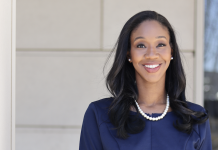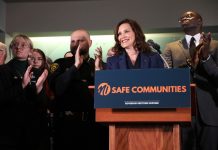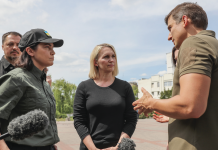
For those of us frustrated that the national media focus far too much on news about the coasts, Dearborn Heights native Heidi Przybyla is a much-needed antidote. She’s an NBC News correspondent who routinely breaks news on Capitol Hill, but she also constantly returns to her earliest stomping grounds for reports that help make sense of the mood and tempo of so-called “flyover states” for bewildered coastal denizens.
The 47-year-old Przybyla, who lives in Alexandria, Virginia, with her husband, cardiologist Jeff Trabb, and their children, Phoebe and Dylan, graduated with a degree in international affairs and German from Michigan State University before heading to Washington, D.C., to embark on a two-decade career in print media. In 2018, she leaped to TV full time.
Przybyla talked to Hour Detroit about how her working-class background informs her work, how covering presidential races has changed, and what it was like to need security to cover the 2020 election in Michigan.
Hour Detroit: How does being from Michigan help you as a journalist?
Heidi Przybyla: Our life experiences can’t be separated from how we go at stories and the inner voice that leads us. For me, that’s where I come from. My dad was very much blue collar — he moved furniture for a living for Corrigan Moving Systems in Farmington Hills. My mom was stay-at-home until I was much older, and then she was a secretary for Ford Motor Co. We were a typical family living in Dearborn Heights, living on a mover’s salary. I very often think about the fact that my parents were able to do something that is so hard for families today — to get by with those kinds of jobs and those kinds of salaries. I didn’t have Jordache jeans. I didn’t have a Cabbage Patch doll. Our vacations were wherever we could get in our station wagon. That was hard for me growing up, but today it’s the thing that I cherish the most because it grounds me.
In May, as the pandemic and presidential campaign revved up, you lost your father to a non-COVID-related ailment. How did that shape your coverage?
NBC was really great. They made it so I could go back to Michigan and report not just on the election but everything that was going on. I did some reporting from downtown Detroit about the protests that came up around busing children to summer school. I did some stories on education secretary Betsy DeVos and how she was camped out in Michigan as schools were struggling with some pretty significant questions about how to reopen and whether to reopen. But it also did give me a considerable amount of time to help my mother over the summer.
You were busy when Michigan became a focal point of baseless claims of election fraud, too.
It was really meaningful and personal to me to have showcased Michigan at a time when my home state was on the frontlines of defending democracy. Being physically present at the TCF Center after Election Day meant I could explain to our viewers what was actually happening: COVID rules were being violated and the police had to intervene. Also, on election night, when the numbers seemed to be going sideways, our anchors brought me in to reset the conversation and explain that the surprise shift toward Trump was a “red mirage.”
How has covering presidential elections changed since your first one in 2000?
Well, nobody was tweeting anything from the Gore plane. It used to be all-consuming, and you had to be away from your family for such long stretches because you couldn’t cover it any other way. It was more of a mix of older men who were able to not have as many family responsibilities and women who had yet to have children. And that’s what I was. For many years I wondered how I would ever continue to do this, given that I also wanted to have a family, but what I found when I covered Hillary Clinton’s campaign for USA Today was that it is completely doable because we had correspondents constantly tweeting and putting out footage of the day-to-day things. I could just do my feature pieces or special reports. Many of the working moms who were on Hillary’s plane felt the same way.
What made you go into a career in media?
This is going to be a funny admission, but if I trace it back to the earliest days, I wanted to be Lois Lane because she was the first brunette heroine I saw. Back then, nearly all the Barbie dolls were blonde. I decided not to study journalism because I was also interested in foreign languages and international affairs. After MSU, I cold-called my way into Washington. My first job was working for a German correspondent as his assistant, and I got it because I could speak German and I knew how to write. That was really where I started.
Did your Michigan bona fides make you more valuable after the national media missed Donald Trump’s surge in the 2016 election?
You’d have to ask my bosses that. I know they really appreciate the Midwestern perspective. I did have some relationships with some members of Congress who were trying to sound the alarm about that.
Debbie Dingell in particular, right?
There you go! And I could see that many people I knew growing up were either Bernie Sanders or Donald Trump voters. Bernie’s having won Michigan in the 2016 primary should have been a wake-up call. I was also on the Clinton plane the day before the election when we were told we were going to Grand Rapids for one of our final stops. I knew something was really off that they were adding that in at the last minute. But I could see it from my own community, that things weren’t necessarily what the polls said. There was a lot of support for Trump out there, particularly among working-class Americans.
Given how Trump attacks the media, did you feel unsafe covering him?
I didn’t, but I wasn’t a lead reporter going to all the rallies or traveling around with the president. Every administration I’ve covered has had some adversarial relationship with the press. George W. Bush used to call us “the filter” and the Clintons had a famously tough relationship with the media. But Trump told us he was going to have an adversarial relationship with us and told us, “Look, I’m doing it to discredit you so no one will believe anything critical.” I mostly have had good experiences talking to people out at Trump rallies and covering polling locations. But this was the first year I needed security to do my job on Election Day.
The Trump administration is known for being super leaky. Will covering Biden be harder?
Yeah. The Biden campaign was certainly a lot less leaky, but it’s harder when they get in and there are these sprawling agencies that now come into play with many, many more players. But it’s going to be harder. Most likely there won’t be as much turnover in key positions, which also leads to leaks. So yeah, it’ll be less leaky.
|
|
|









